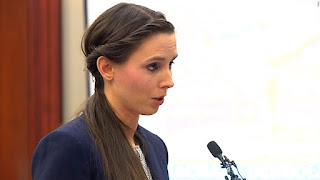Forgiving the Unforgiveable
Can you forgive the unforgivable?
That's not a rhetorical question. It's not even theoretical. It plays out, in real life and in real situations.
A few weeks ago, Larry Nassar, a former doctor who worked at Michigan State University and worked with the USA Gymnastics program, was found guilty of multiple counts of sexual abuse. He will spend the rest of his life in jail.
Nassar was convicted of repeatedly sexually assault young girl in the gymnastics program. He hurt and abused them in despicable ways. Sadly, he got away with it for years and years. That was until Rachael Denhollender, a Louisville attorney and former US gymnast, brought allegations against him to the Indianapolis Star newspaper. That set in motion an investigation that eventually brought Nassar to justice.
At Nassar's sentencing hearing, many women, including Denhollender, was given the opportunity to speak. She chose to address not only the court but Nassar himself. He words, found here, are powerful and cutting. She wanted Nassar to be brought to justice. She wanted him to pay for his crimes. But she also wanted him to know God forgives and so does she.
She forgave what many of us would say is unforgivable. She didn't do it because it was natural. In fact, that kind of forgiveness is super natural. It takes Christ to forgive on that level.
On the cross, as Jesus hung there dying, he spoke to the Father. He asked God the Father to forgive the people crucifying him and taunting him and challenging him because they didn't understand what they were doing. He wanted God to forgive those who were killing him. He wanted to forgive those who killed God in the flesh.
That's powerful. It's also a reminder. Forgiveness came at a price--a hefty one. It cost Jesus his life. Yet, it is also something we are to do. As Christians, we are imitate Jesus. That doesn't mean we don't seek justice. In fact, we should. It does mean we do it without malice and with a desire to see repentance for the wrongs that have been done.
Jesus did that on the cross. He gives us an example to follow.
That's not a rhetorical question. It's not even theoretical. It plays out, in real life and in real situations.
A few weeks ago, Larry Nassar, a former doctor who worked at Michigan State University and worked with the USA Gymnastics program, was found guilty of multiple counts of sexual abuse. He will spend the rest of his life in jail.
Nassar was convicted of repeatedly sexually assault young girl in the gymnastics program. He hurt and abused them in despicable ways. Sadly, he got away with it for years and years. That was until Rachael Denhollender, a Louisville attorney and former US gymnast, brought allegations against him to the Indianapolis Star newspaper. That set in motion an investigation that eventually brought Nassar to justice.
At Nassar's sentencing hearing, many women, including Denhollender, was given the opportunity to speak. She chose to address not only the court but Nassar himself. He words, found here, are powerful and cutting. She wanted Nassar to be brought to justice. She wanted him to pay for his crimes. But she also wanted him to know God forgives and so does she.
She forgave what many of us would say is unforgivable. She didn't do it because it was natural. In fact, that kind of forgiveness is super natural. It takes Christ to forgive on that level.
On the cross, as Jesus hung there dying, he spoke to the Father. He asked God the Father to forgive the people crucifying him and taunting him and challenging him because they didn't understand what they were doing. He wanted God to forgive those who were killing him. He wanted to forgive those who killed God in the flesh.
That's powerful. It's also a reminder. Forgiveness came at a price--a hefty one. It cost Jesus his life. Yet, it is also something we are to do. As Christians, we are imitate Jesus. That doesn't mean we don't seek justice. In fact, we should. It does mean we do it without malice and with a desire to see repentance for the wrongs that have been done.
Jesus did that on the cross. He gives us an example to follow.



Comments
Post a Comment